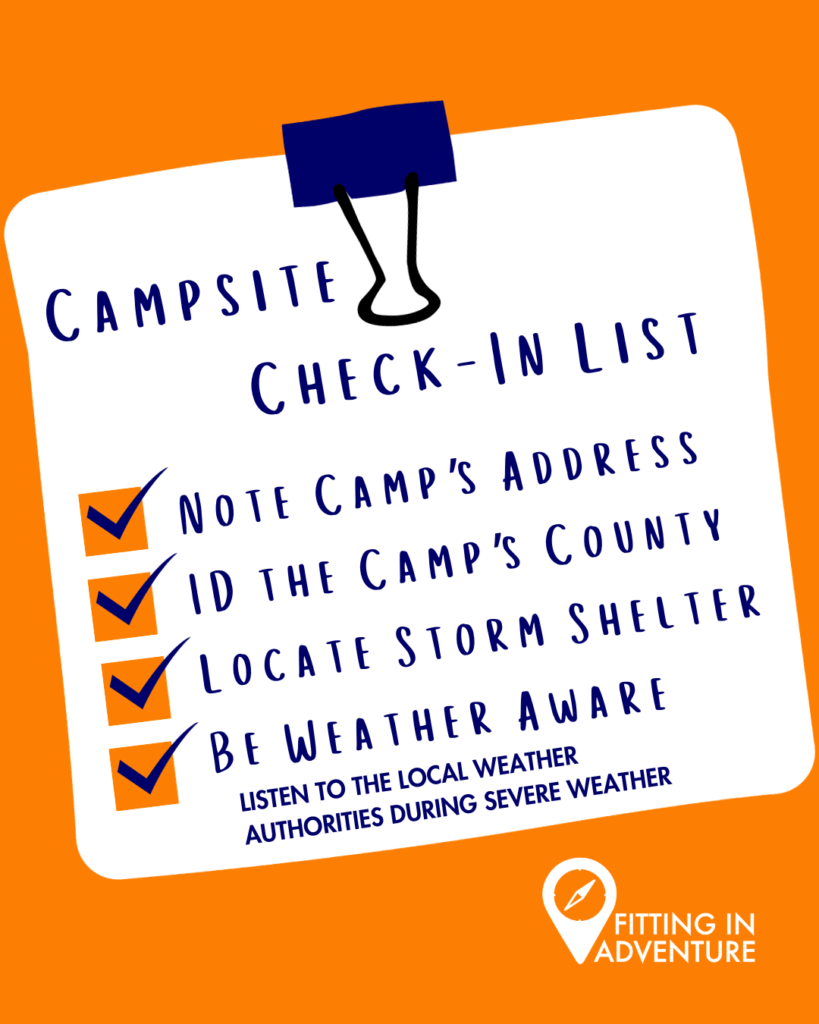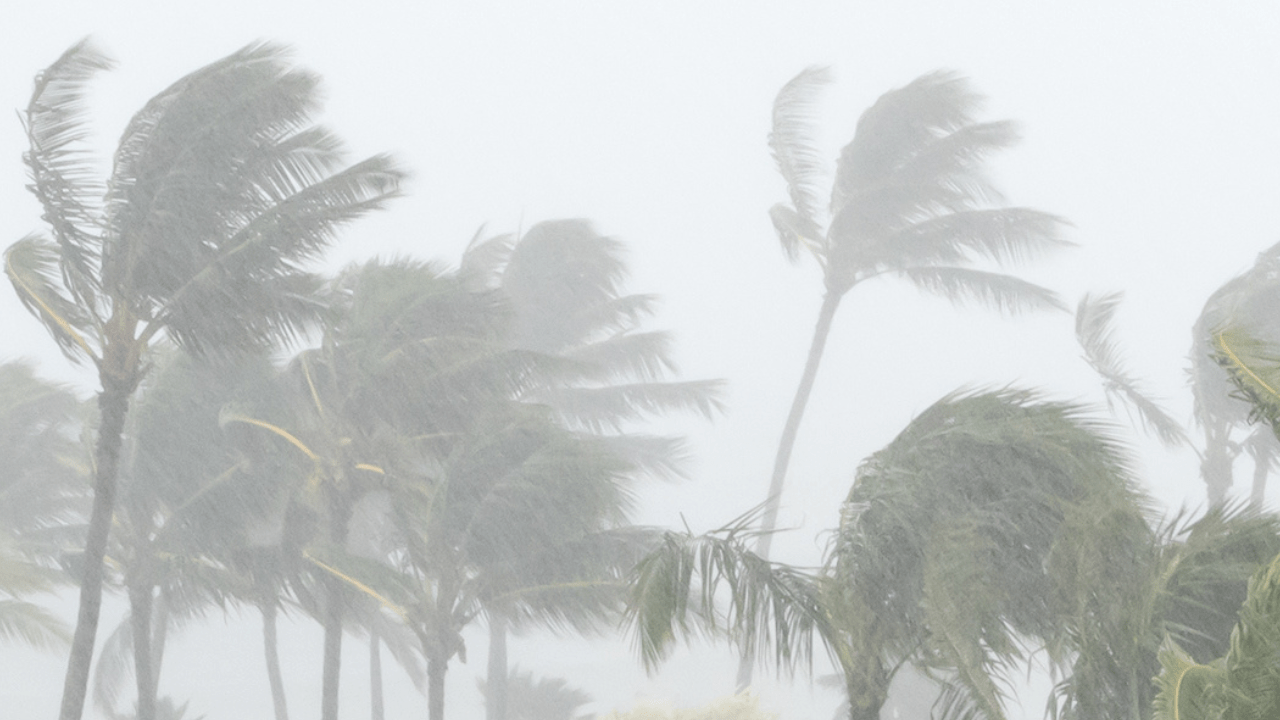RVing during severe weather creates the need for more planning. Severe weather can be unpredictable and dangerous, making it crucial to take necessary precautions to ensure your safety. After a few years on the road, we’ve weathered countless thunderstorms, a few tornadoes, and (so far) two hurricanes. While we always prefer to get out of Mother Nature’s way, we have developed some tips for when that is not possible.
Disclosure: Some links on our site are affiliate links. If you purchase a linked item, we will make a commission, at no extra charge to you.
Checking into your RV Campsite
When checking into your RV campsite, it’s wise to take a few precautionary steps that can prove invaluable in case of severe weather or other emergencies. First, make a note of the RV camp’s address and keep it readily accessible in the same location for quick access should you need to call for assistance.

Additionally, be aware of the county you’re camping in, as severe weather warnings and watches are often communicated based on county boundaries, ensuring that you stay informed about the local conditions.
Finding out the location of your designated storm shelter is crucial in case you end up RVing during severe weather. These shelters are typically situated in facilities like laundry or restroom buildings. Take the time to familiarize yourself with their exact locations to ensure you can reach them swiftly when necessary.
For those traveling with pets, it’s essential to arrange for their safety as well. Make sure your pets can accompany you to the shelter and be prepared with items to make them more comfortable during the ordeal. Many RVers find collapsible crates to be a practical solution, ensuring that their furry companions are allowed in shelters and are shielded from potential stressors such as other pets during what can already be a challenging situation. These proactive steps can provide peace of mind and enhance your preparedness while camping or RVing.
RVing in Severe Weather: Essential Apps
While you may have come to rely on your phone for emergency alerts in your sticks-and-bricks home, it is time to get more serious about weather preparedness in your RV. Phone alerts can be significantly delayed leaving you with no time to seek shelter.
NOAA weather radios and weather apps are essential tools for RVers. They provide real-time updates on severe weather, so you can stay informed and take action to protect yourself.
- NOAA weather radios: These dedicated devices broadcast weather warnings, watches, and advisories. They’re a reliable way to get the latest information about severe weather in your area.
- Weather apps: There are many weather apps available for smartphones and tablets. These apps can provide real-time weather forecasts, radar imagery, and severe weather alerts. Some weather apps also allow you to customize your alerts based on location.
- Basic Phone Weather App
- The Weather Channels (Paid Verison)
Tips for Staying Safe while RVing During Severe Weather
Getting out of the way of severe weather will always be your best option. However, severe weather can pop up suddenly so it is not always an option.
- Fill your tanks. When severe weather is approaching, fill your RV’s water and fuel tanks. This added weight can help stabilize your vehicle during high winds.
- Pull in slides if possible. If your RV has slide-outs, retract them before the storm hits. This will minimize the risk of damage from flying debris.
- Have an emergency kit. An emergency kit should include essentials like flashlights, batteries, a first-aid kit, and a radio/weather radio.
- Know your escape routes. Before severe weather strikes, familiarize yourself with local road conditions, alternative routes, and the location of emergency shelters. This will help you make a quick and safe escape if necessary.
- Stay updated. Continuously monitor weather updates on your NOAA weather radio, local news and weather app. Pay attention to any evacuation orders or local advisories.
- Have a paper map to identify nearby cities/counties discussed on the local news. We use the truck safe atlas we have for trip planning.
- Stay calm. It’s important to stay calm during a storm. This will help you make rational decisions and stay safe.
Pets and RVing during Severe Weather
Traveling with pets in an RV can introduce an additional layer of stress to the experience if your pets are anxious during storms. The confined space means they’ll be more exposed to the sounds of the weather, and in the event you need to seek shelter, you might find yourself sharing that space with other people and their animals.
To ensure your pets’ comfort and safety during these situations you will need to come prepared. Be sure to have your pets’ harness and leash on hand, as well as an adequate supply of water. We like to keep their harnesses on for the duration of the storm. We also have an Apple Tag on their harness just in case we have an escapee. For smaller pets, we highly recommend carrying a collapsible crate. This can provide them with a secure and familiar space amid the potential chaos of severe weather, helping to ease their anxiety and ensuring their well-being.
Our pups also need their calming treats to get through severe weather.
Document your RV Condition
Before the storm arrives, take a quick video or photos of your RV and tow vehicle to document their current condition. This documentation can prove invaluable for insurance purposes and should be a part of your regular practices. It provides a visual record that can help streamline any claims or repairs that may be necessary.
When it comes to parking your RV during severe weather, prioritize safety. If possible, choose a location that is well away from trees, power lines, and other potential hazards. Parking in a sheltered area or a designated storm shelter is even better if it’s available. This strategic placement can significantly reduce the risk of damage to your RV and enhance your safety.
Tip: Some RV storage facilities in Florida are in hurricane buildings. Some will store their RVs and hit a hotel to find a safer place during hurricanes.
Once the storm has passed, take the time to thoroughly inspect your RV for any signs of damage. This step is critical, as identifying and addressing issues promptly can prevent more extensive problems down the road. It’s all part of ensuring that your RV adventure remains enjoyable and hassle-free, even in the face of severe weather challenges.
While severe weather can indeed present challenges, with adequate preparation and precautions, you can weather the storm and continue to relish your RV journey to the fullest.
Disclaimer: This is not an all-inclusive list. Please listen to your local officials for the specifics of the weather you are facing.
Check out our visit to the Key West National Weather Service Lab to see how the professionals keep us safer.

